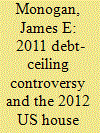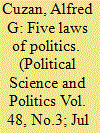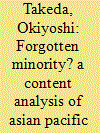|
|
|
Sort Order |
|
|
|
Items / Page
|
|
|
|
|
|
|
| Srl | Item |
| 1 |
ID:
140223


|
|
|
|
|
| Summary/Abstract |
This article considers how a key legislative vote—that is, the August 2011 vote to raise the federal debt ceiling—influenced the 2012 elections for the US House of Representatives. Two outcomes are analyzed: (1) the incumbents’ ability to retain their seats through the 2012 general election, and (2) their share of the two-party vote for members who faced a general-election competitor. In developing this study, the research design was registered and released publicly before the votes were counted in 2012. Therefore, this article also illustrates how study preregistration can work in practice for political science. The findings show that seat retention did not vary with the treatment; however, incumbents who voted against raising the debt ceiling earned an additional 2.4 percentage points of the two-party vote.
|
|
|
|
|
|
|
|
|
|
|
|
|
|
|
|
| 2 |
ID:
140227


|
|
|
|
|
| Summary/Abstract |
Foreign policy and security studies typically are considered male-dominated domains in the discipline of international relations (IR), yet many women work in these policy domains, particularly in the United States. The “invisible women” working in foreign policy often come from fields such as IR, in which gender stereotypes may influence their understanding of the careers available to them. This research project seeks to understand student assumptions about gender roles in IR and the effects of those assumptions. Survey data collected from students in IR courses in 2011 and 2012 reveal that stereotyping of IR subfields is common but that individual students’ academic and career interests often diverge from those stereotypes. This finding is relevant not simply because it may explain the presence of women in foreign-policy careers but also because it provides useful pedagogical information for instructors in the IR field.
|
|
|
|
|
|
|
|
|
|
|
|
|
|
|
|
| 3 |
ID:
140222


|
|
|
|
|
| Summary/Abstract |
Drawing on more than 500 elections from around the world, this article presents five empirical laws of politics. Four of these laws span democracies and dictatorships, and one sets a boundary between the two. In both regimes the governing party or coalition represents a minority of the electorate. In democracies this minority usually represents a plurality that amounts to about one third of the electorate. Judging by the outcome of the first free elections in regimes undergoing a transition, there is reason to believe that in dictatorships the minority is much smaller. Even as they have an advantage over the opposition, the incumbents experience an erosion of support over time. In democracies this leads to alternation in office, which in turn ensures that across many elections about two-thirds of the electorate gets to see its favorite party or coalition in government from time to time. In dictatorships, during long periods in office, support for the ruling party shrinks to insignificance. Also in democracies, it is rare for incumbents to receive more than 60 percent of the vote, and it never happens twice within the same spell in government. This appears to be a reliable indicator that differentiates all democracies from most dictatorships. The conclusion is inescapable—the dictatorial “passion for unanimity” and illusion of “organic unity” notwithstanding, the state is a plurality. The will of the electorate emerges as a result of competition among political parties.
|
|
|
|
|
|
|
|
|
|
|
|
|
|
|
|
| 4 |
ID:
140224


|
|
|
|
|
| Summary/Abstract |
Textbooks are the most important pedagogical tools in higher education and they should convey sufficient and accurate information on minority groups and women in the United States. Yet textbooks tend to marginalize these groups in their depictions. This article examines the coverage of Asian Pacific Americans in twenty-eight American Government or Politics textbooks. Asian Pacific Americans have faced a unique history of exclusion, discrimination, and stereotyping. The content analysis of the textbooks reveals that textbooks do not fully cover their history and contributions to US politics, either measured by page numbers or by historical events and figures important to Asian Pacific Americans. To rectify this lack of coverage, this article concludes with five constructive recommendations, including an option to invite scholars on Asian Pacific American politics to serve as textbook reviewers and textbook coauthors.
|
|
|
|
|
|
|
|
|
|
|
|
|
|
|
|
| 5 |
ID:
140226


|
|
|
|
|
| Summary/Abstract |
Lecture-capture software allows instructors to record their class presentations for students to review as necessary. Although this technology has long been considered too expensive for large-scale use, it is quickly becoming ubiquitous and deployable using ordinary computers and consumer-grade software. Using survey and final-grade data from a three-semester trial in a large introductory-level political science course, the authors demonstrate students almost universally approve of the technology and support its use in future classes. Students are most likely to use recordings when they study for exams and catch up on material after being absent from class. Additionally, certain subgroups—primarily international students and those who are performing poorly in the class—are more likely to watch archived recordings. However, these data demonstrate that positive evaluations and increased usage may not translate into better grades; viewing lectures does not appear to substantially improve individual performance.
|
|
|
|
|
|
|
|
|
|
|
|
|
|
|
|
| 6 |
ID:
140225


|
|
|
|
|
| Summary/Abstract |
This article describes the current debate on the practice of preregistration in political science—that is, publicly releasing a research design before observing outcome data. The case in favor of preregistration maintains that it can restrain four potential causes of publication bias, clearly distinguish deductive and inductive studies, add transparency regarding a researcher’s motivation, and liberate researchers who may be pressured to find specific results. Concerns about preregistration maintain that it is less suitable for the study of historical data, could reduce data exploration, may not allow for contextual problems that emerge in field research, and may increase the difficulty of finding true positive results. This article makes the case that these concerns can be addressed in preregistered studies, and it offers advice to those who would like to pursue study registration in their own work.
|
|
|
|
|
|
|
|
|
|
|
|
|
|
|
|
| 7 |
ID:
140228


|
|
|
|
|
| Summary/Abstract |
Since the fall semester of 2008, I have used music to teach political theory to undergraduate students. I use song lyrics to make analogies to concepts used by political theorists, and I use the music to create associations that improve students’ memory of those concepts. Unlike other teachers who incorporate music into their classes by linking lyrics to concepts, I choose songs that reflect important ideas of specific theorists through multiple allusions to their ideas. The songs I choose serve four objectives: introducing concepts that may be difficult for students to appreciate, illustrating the application of those concepts, reinforcing students’ memory through issue-spotting songs, and presenting biographical information about the theorist that they are reading. I illustrate how I achieve these objectives through songs drawn from artists including Billy Joel, Ace of Base, and Supertramp, and musicals including West Side Story and Camelot.
|
|
|
|
|
|
|
|
|
|
|
|
|
|
|
|
|
|
|
|
|